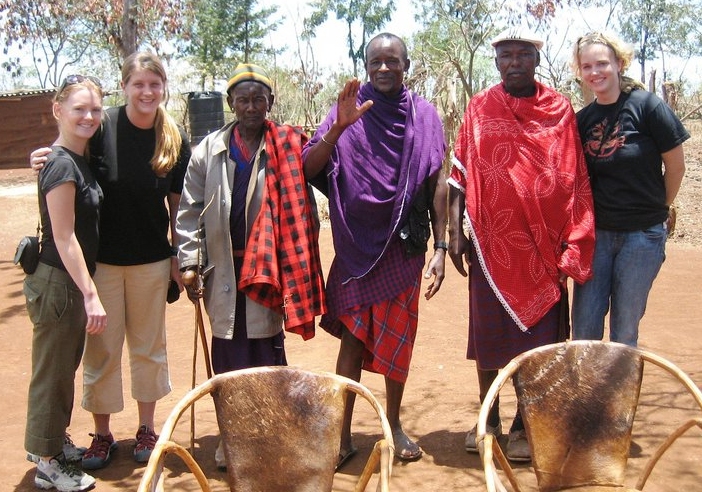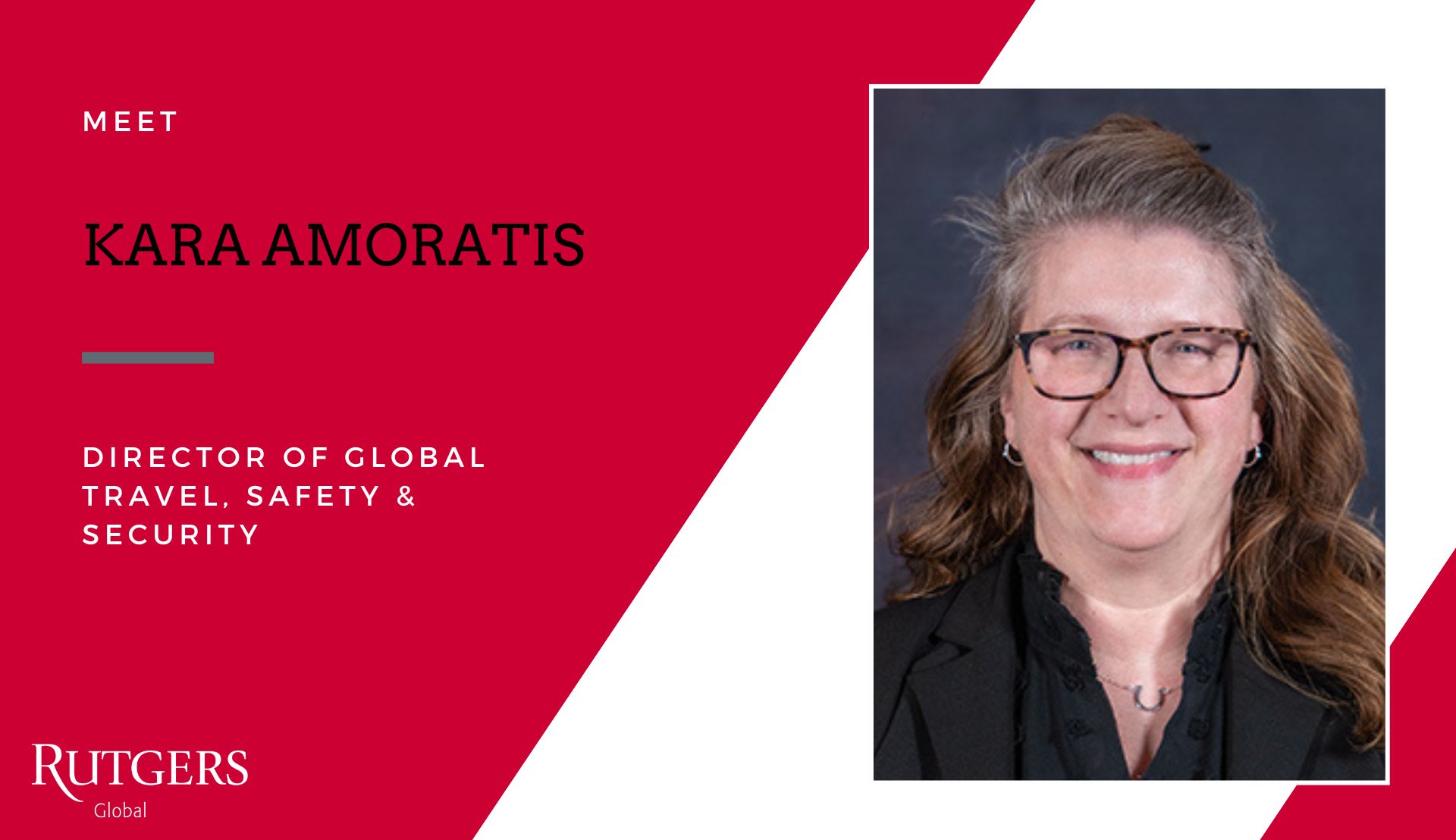Rutgers Global is pleased to welcome Kara Amoratis as the new Director of Global Travel, Safety & Security at Rutgers University. This role, which is new to Rutgers, is responsible for developing and coordinating policies, procedures, and activities that support the well-being of students and faculty and staff who travel abroad for study or university business. Amoratis will be positioned within Rutgers Global Center for Global Education office on College Avenue but will also report to University’s Risk Management and Insurance office, ensuring that her position serves all campuses. She will liaise with multiple units at Rutgers, including academic departments, athletics, and public safety, as well as human resources, academic affairs, and communications.

Amoratis is incredibly well-suited to this role, having been the first to fill the same type of position at both Penn State University and Princeton University. “I started at Penn State in 2012 after the combination of the Egyptian revolution and the tsunami in Japan in 2011 made university officials realize that someone needed to be paying attention to global crises and their impacts on university students and faculty all the time,” Amoratis said. She came to Penn State after working at International SOS as overnight, weekend operational support for a wide variety of clients. After establishing and growing the global safety office at Penn State, and a stint at her alma mater – Arcadia University - she was tapped to join the newly imagined Global Safety and Security office at Princeton University. It was at Princeton that she saw the start of the COVID pandemic and was among the first to “raise the flag” on the pandemic and its potential impact.
“Around January 4, 2020, I had Wuhan on my radar and gathered together the travel oversight group at Princeton,” Amoratis remembered. By January 20, she had kicked it up to the risk task force. Princeton has a signature Bridge Year program that places first year students all over the world, and Amoratis was tasked with bringing these as well as every other Princeton student home safely. “I remember getting notifications that airspaces all over the world were shutting down, so it was a challenge. In one instance, I had to work with Senator Bob Menendez’s office and the U.S. embassy in Lima to try to get students back to the U.S. from Peru. At the same time, we had to ask the host-father to drive students quite a distance across Morocco so they could board a flight back home.” Amoratis remembers the date of March 27 as pivotal, as that was the day the last Princeton student was brought safely home. “I still celebrate on that day each year,” she said. It was a life-changing experience and one that provided untold lessons in risk management for Amoratis. “People may not know the COVID pandemic necessitated the largest airlift of American citizens ever in history,” said Amoratis.
One outcome of the COVID pandemic and resulting lockdowns was that it helped to shine the spotlight on the crucial role of a global safety and security officer in the higher education space.
“Back in 2012 when I started at Penn State, I was one of only maybe twenty dedicated safety professionals in higher education,” remarked Amoratis. She mentions how Gary Landsdale, former assistant vice president and university risk officer at Penn State, was instrumental in raising the profile of this role and its critical importance for colleges and universities. “Gary was a beacon in the Big 10 for the importance of international risk management,” she said.
Though most universities are well-informed of where their students are because of study abroad offices and protocols, sometimes faculty and staff traveling internationally may not be on the radar, which can be problematic. Amoratis said, “It’s a bit of an elephant in the room but the reality is that faculty choose to travel, they are not mandated to, and unless there is a built-in system for reporting on international travel for faculty, it’s hard to know where they are and help in a crisis situation.” COVID brought about new travel policies that have helped with this, reframing that there isn’t any judgment, rather it’s strictly about safety. Rutgers University is making strides in this space via the Direct Travel program which helps the university stay in the know about faculty who are traveling internationally.
What are the challenges and opportunities at Rutgers that Amoratis sees? “At a large institution like Rutgers, centralization can be a challenge. Sometimes it is viewed as a dirty word but it’s really about how we can hold each other up, and what to do when things go wrong.” She believes that global safety concerns offer an opportunity for partnership. What Rutgers is doing well, according to Amoratis? “Rutgers has a unique risk tolerance,” she said. “What I mean by this is that Rutgers does not take a shielded view—they find value in debate and asking ‘why not?’ This is a great quality.” In addition, Amoratis likes that risk analysis at Rutgers is grounded in asking the question “what else?” She said, “This is a great question to ask, and it means that the people at Rutgers are looking at things in a more comprehensive way.”
The job of a global safety office at a university is multi-faceted and comprehensive. In fact, a conversation with Amoratis leads one to think that she may have one of the most interesting and stressful jobs in higher education. At a university like Rutgers and at any given time, there may be hundreds if not thousands of students, faculty, and staff traveling around the world and if, say, a natural disaster or political crisis emerges, you need someone who can activate an escape plan, and fast.
Beyond the multiple collaborations within the university structure to help with this, it is also crucial to have a network around the globe of key contacts at embassies, consulates, and partner institutions. Amoratis said, “The key to being successful in this role is to build up a toolkit and network of individuals and resources.” She is also a fan of using flow charts to work through various scenarios and plans. Regarding communications, Amoratis believes that our current state of unfettered access via cell phone can complicate things. “The downside is that students may ignore their phones, which can lead to panic, often on the part of their parents. But the upside is that if they answer their phones, that direct communication with the student can allay fears and reassure parents instantly.” Amoratis uses all the tools at her disposal, including her professional training and experience, her education (she received her Master’s degree in International Peace and Conflict Resolution from Arcadia University), and a very calm voice and demeanor.
Where does Amoratis go to stay informed? “The main news channels—the New York Times, Washington Post, Wall Street Journal—as well as overseas news from the UK, South Africa, Kenya, China, and India. I also listen to a lot of public radio and podcasts (the Economist and Atlantic are good ones). And I get a newsletter twice a day from the Overseas Security Advisory Council (OSAC).” And despite lots of recent news about the platform, Amoratis is very reliant on Twitter. “Despite all the recent tumult of Twitter, I think it is getting back on track and it is unbeatable for up-to-the-minute updates.” (You may want to follow her. Her handle is @KEAmoratis).
One can only imagine the stories Amoratis has to tell about her experiences. When asked about some of the most extreme situations that Amoratis has had to deal with, she responded: “Where do I begin?” She continued, “COVID was unprecedented, of course, but I’ve also dealt with terrorism in Mumbai, trafficking in East Africa, among other catastrophes that I probably shouldn’t share.”
Rutgers University is fortunate to have Kara Amoratis, a seasoned professional in this new and much-needed role. She will be starting a blog with updates on global safety and security that will be available on the Rutgers Global website.
To reach Kara Amoratis, email kara.amoratis@global.rutgers.edu

